Te Houtaewa Ultramarathon 63km with a Big Surprise 🏆
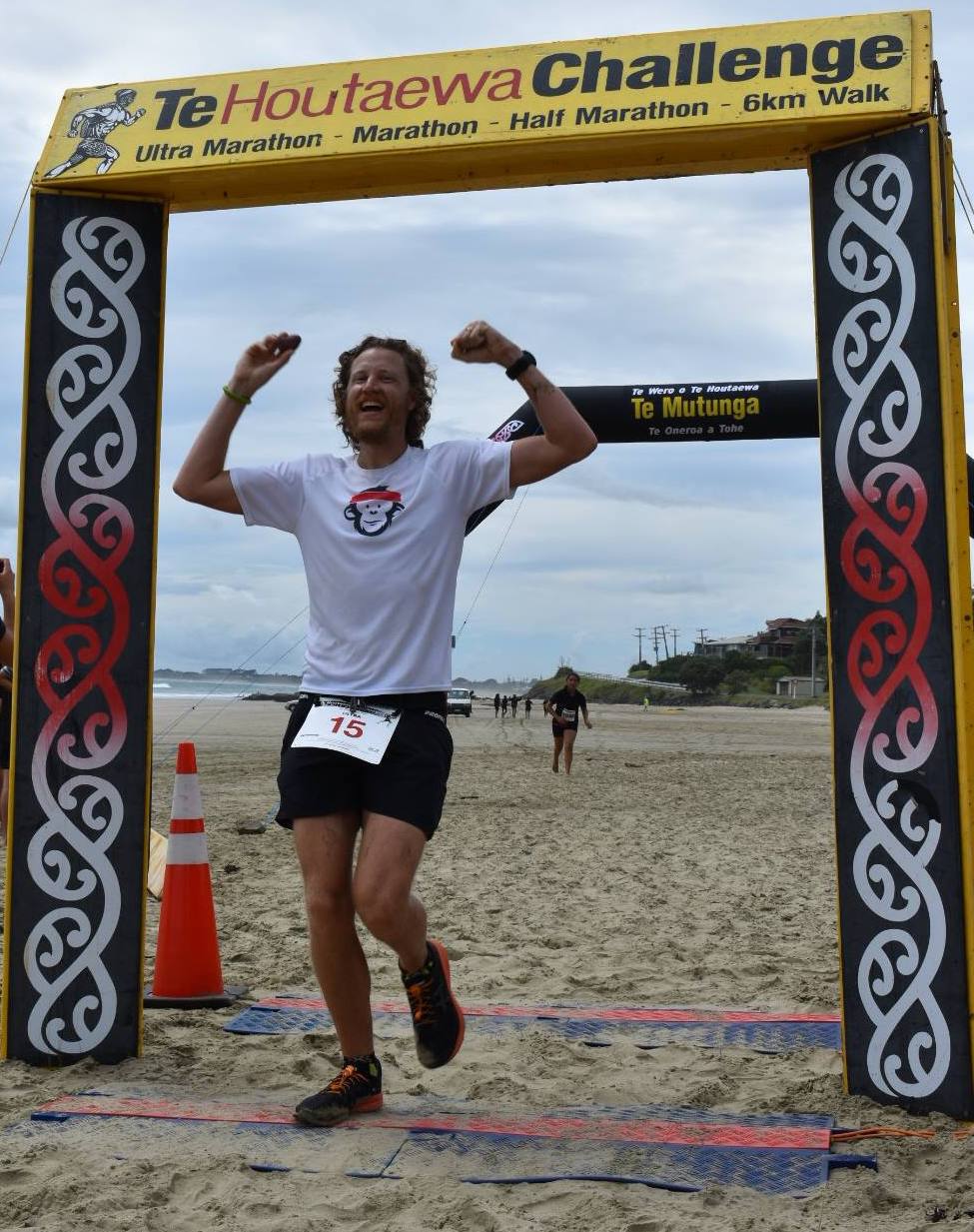
I first heard about this event while on a bike trip through the Northland region of New Zealand three years ago. Suddenly, an advertisement sign at the side of the road caught my eye. 90 Mile Beach Ultramarathon, that sounds interesting! A bit long, but interesting none the less. 90 miles is about 145 kilometers.
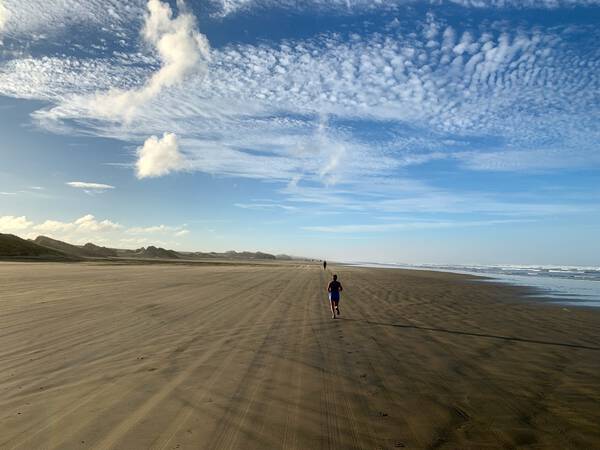
Fortunately, the European settlers who arrived in New Zealand, conquered the islands, and named everything as they pleased, weren’t able to accurately measure a perfectly straight long beach’s length. In fact, it’s about 88 kilometers (55 miles) long.
Te-Oneroa-a-Tōhē
To the native Maori, the beach has been known as Te-Oneroa-a-Tōhē – “the tropical bridge” – for a much longer time. It’s a spiritual place for them, as they believe that after they die their souls wander up north to find peace at the northern most end of the North Island, Cape Reinga. The beach functions as one of the passage ways the souls will travel on. It all has a mystique and unique aura going on.
When we planned our extended stay in the country, I was delighted to find out that accidentally the 2019 version of the race along the beach would fall perfectly in line with our trip. So I signed up, of course. The website could use a bit of an improvement (Hi guys, I run a web design agency!), but it served its purpose.
Te Houtaewa
Here’s another beautiful sounding Maori name. It really is a pretty language and it’s interesting to hear my daughter Julie come home from school every day with a bunch more Maori words in her brain. They teach the basics at most schools over here.
But what or who is this Te Houtaewa? A person. A legendary Maori runner with great abilities. He would often use his superior running to trick the other tribes of the region. One of those times, he was supposed to get a few Kumara (New Zealand sweet potatoes 🍠) for his family’s dinner but decided to steal those from a rival tribe located dozens of kilometers away from his own place of living. He made it there and back again, part of the way being chased and even shot by these enemies he annoyed, but he delivered the Kumara which fed the family in the end.
Stories similar to this one are existing in the ancestry of every person on earth, I imagine. It’s easy to forget how it happened that we all are alive today. In the end, it’s thanks to our ancestors doing brave and crazy things to help their offspring survive sometimes dire situations. From my point of view, this race was a ceremony to honor our collective ancestors. Spiritual or rational, it makes no difference.
Waiata and Teresa
It took a few hours to drive north from Auckland to Kaitaia, a town near the southern end of the 90 Mile Beach. In the town’s center, I was warmly greeted by two of the event managers along with a few helpers. Waiata and Teresa immediately sent out this hospitable and welcoming aura, smiling and joking around with me, focussed on putting together this event but somehow relaxed at the same time. In other words, I felt I came to the right place. Bib number 15 and a well-designed shirt, that’s all.
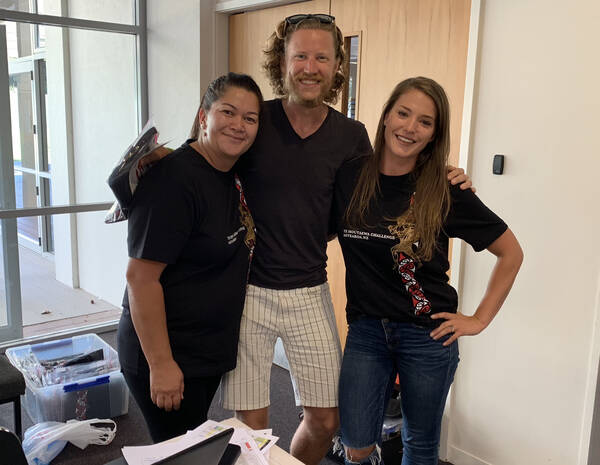
Sophie secured this amazing apartment for us, very close to the beach. A big advantage of such a long beach is that everyone can easily have a house on the beach. It’s very remote, though, and most of the beach still seems untouched. It’s nicer that way.
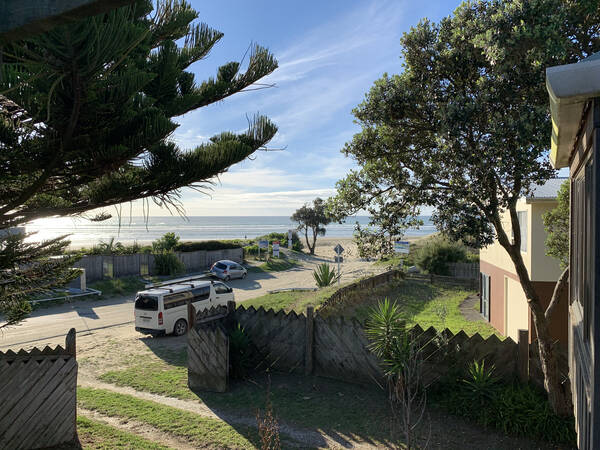
The kids and I had a bit of evening fun on the shore. Not quite being able to see Australia from here, but good enough views. Breath-taking, honestly.
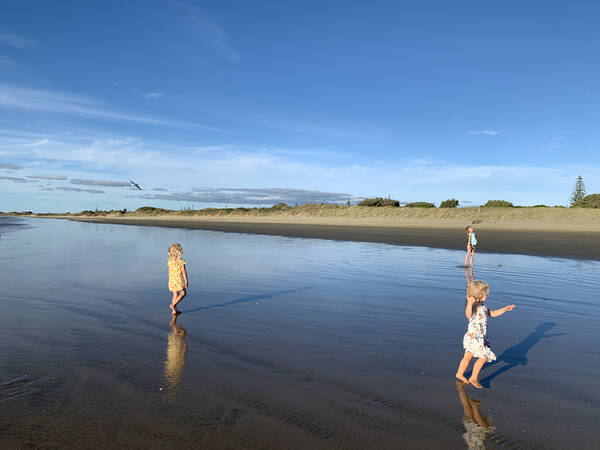
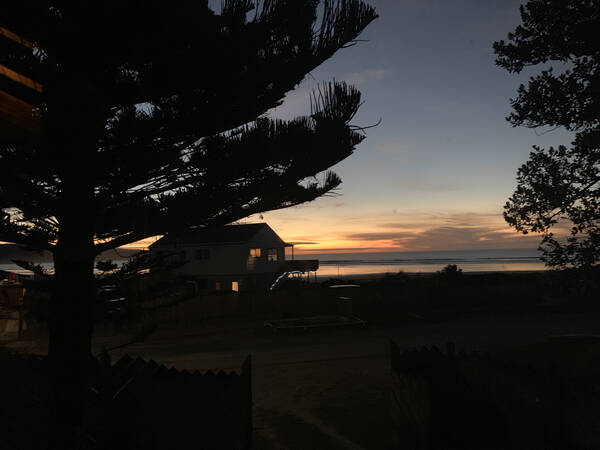
Pasta, sleep, alarm at 4:15 AM, oatmeal, smoothie, the basic routine. Again, as I leave the house, the night sky is stunning. I have no clue about astronomy, but maybe I was seeing the milky way. No light pollution in this town.
The shuttle bus would pick me and a few equally tired ultra runners up at the future finish line in the PariPari area of the town of Ahipara – gotta love these names – at 5:30 sharp. You snooze, you lose. The bus would stop at Kaitaia, the next biggest town, to collect a few more runners and leave for the start up north.
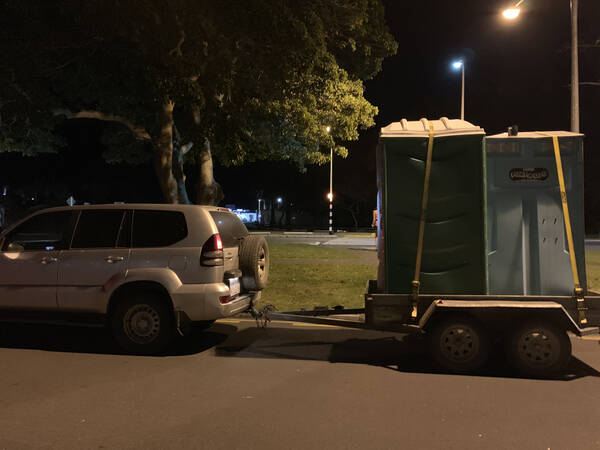
It was here that we were introduced to more of the Maori culture. One of them, a nice old man, switched into the role of Master of Ceremony, joked a bit, welcomed us all, and said a few Maori words as well as a prayer to keep us all safe. He explained the cultural significance to us, the spirituality as well, but all the while kept it lightly. I liked him instantly.
Ultra Endurance and Spirituality
In that situation, standing in a circle in the dark early morning before an ultramarathon race while listening to Maori prayers, I felt reminded of the Hawaiian culture surrounding the IRONMAN World Championships. Every year you can witness a similar connection between that ultra endurance event and the tribal spirituality of the island being intertwined in a similar way. The Maori and Hawaiian cultures share ancestry from not too long ago, evolutionary speaking, but it seems there must be something stronger there. Maybe spirituality and ultra endurance are inherently close together. When asked why I run these long distances so often, I usually mention the mental break it gives me. Clearing the mind, putting the daily problems into perspective for a while, centering myself on a simple task to feel at ease with everything for the time being. That’s not too far off from a spiritual experience.
So I thought, this situation here adds a lot to that, great!
The off-road bus took us up north, at first on the asphalt but after a while we drove down to the beach. This beach is special in one additional way, and that’s its classification as a road! The sand is hard so you usually don’t sink. Better bring a 4x4 car, though. It happens a lot to moron tourists in their rental cars. Our driver was battle tested, so that wasn’t an issue. A good hour later, the sun now slightly lightening up the landscape, we found ourselves at a seemingly random and very remote place of the 90 Mile Beach, 63 kilometers north of that finish line in Ahipara.
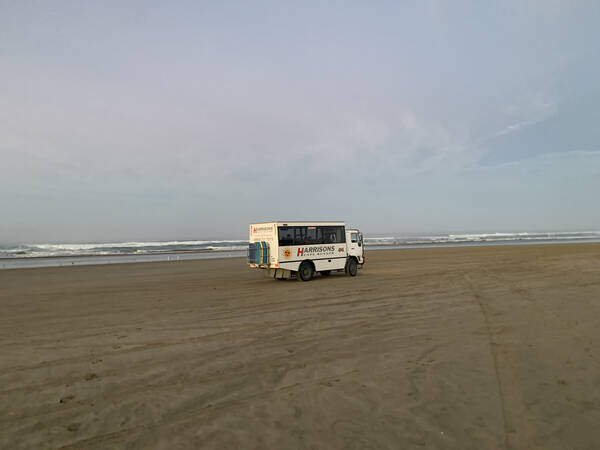
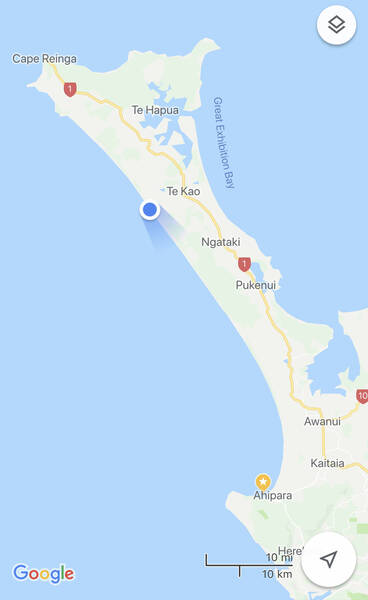
Our Master of Ceremony gathered us, spoke another prayer to keep us all safe, and told us about the Kumara that Te Houtaewa carried. It was here, he said, that Te Houtaewa started his long run to steal the food from the enemy back in Ahipara.
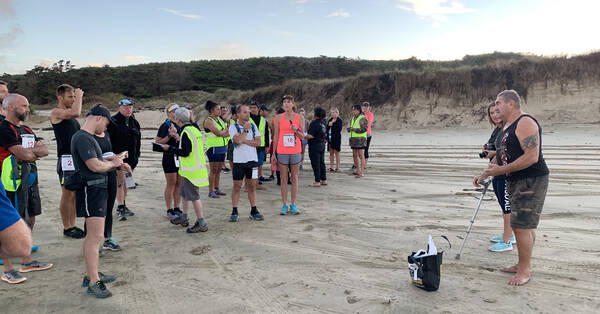
It will be our task to carry a symbolic Kumara to Ahipara in order to repay and reunite the tribes and even, by extension, us foreigners with the Maori of the Northlands. Given the complicated shared history, to put it mildly, that’s quite an honor. For each of us to carry one back, he would empty a bag of small Kumara, laughing as some of us looked to find the tiniest possible Kumara.
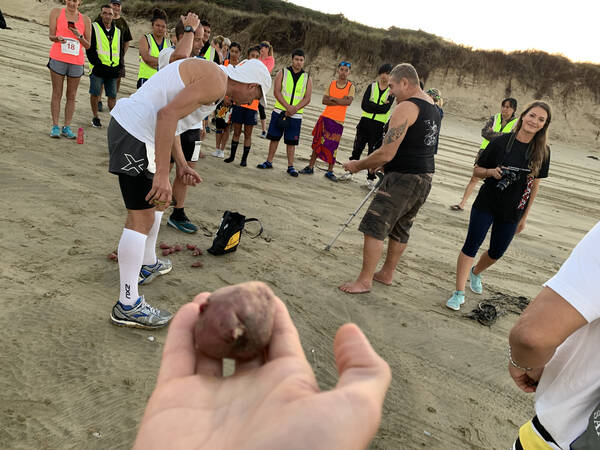
One volunteering runner was selected to be part of a small ceremony with a Maori boy to accept the challenge.
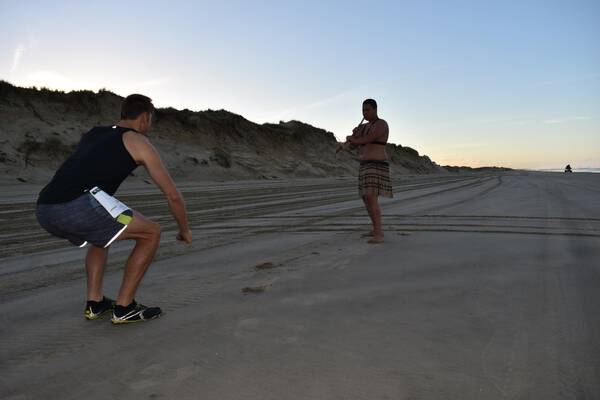
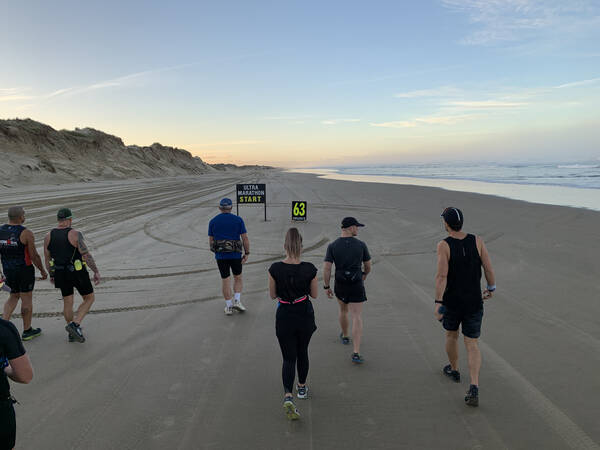
Start of the Race
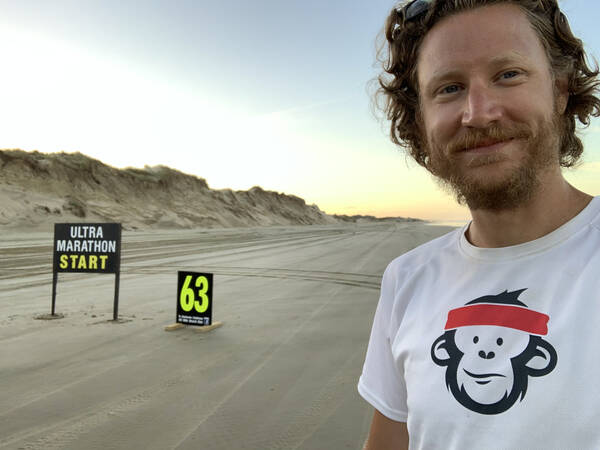
Again, today’s conditions couldn’t have been better. It’s hard to believe how lucky I’ve been recently during marathons. The temperature was around 20 to maybe 22 degrees, while the sun was hidden by soft clouds for about 50 to 60 percent of the time. There was no rain, but a bit of a warm tail-wind, noticeable from time to time.
And those views of that endless beach were just stunning, again. What a special place.

I would guess there were around 20 participants of this ultramarathon. A relay team also started at this point, as well as two local school-kid relay teams.
I was immediately loving this.
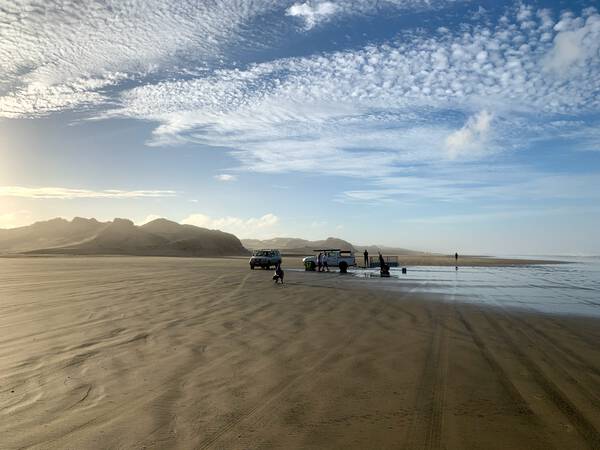
Volunteers had driven up the beach in their 4x4’s to help us out here. Every three kilometers, there was someone with a table offering water, flat coke, bananas, sometimes a gel. These people are saints for offering their free time to stand around for hours helping us out. I had many tiny chats with them.
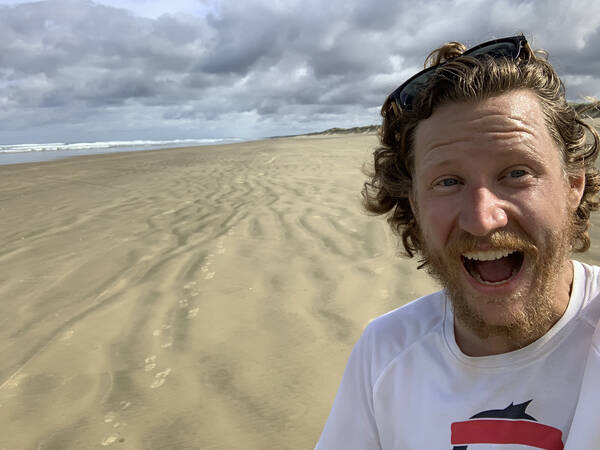
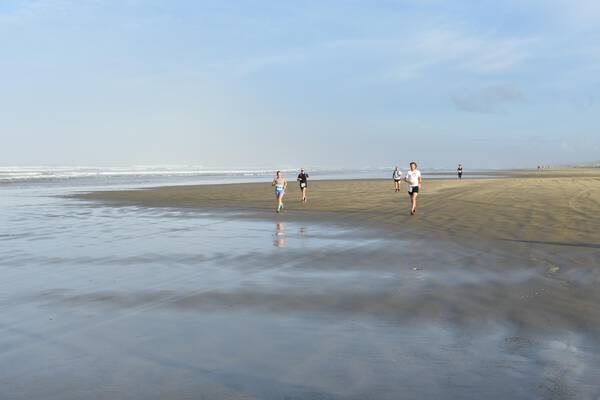
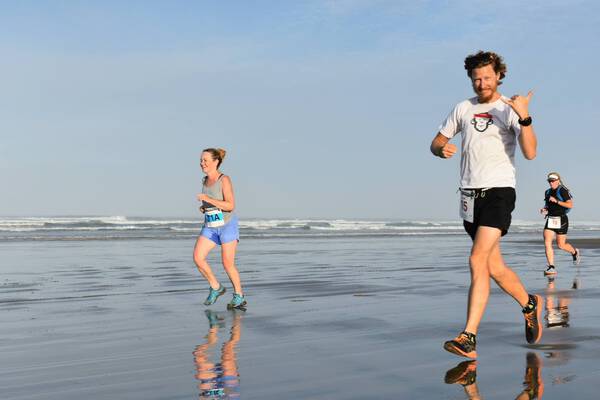
Suddenly, during this isolated run, there were kilometers of fishermen and women standing in the waves. Must have been some sort of gathering. I would have liked to learn what their chances of success here were. Or what they would catch, exactly. But it looked as if they knew what they were doing.
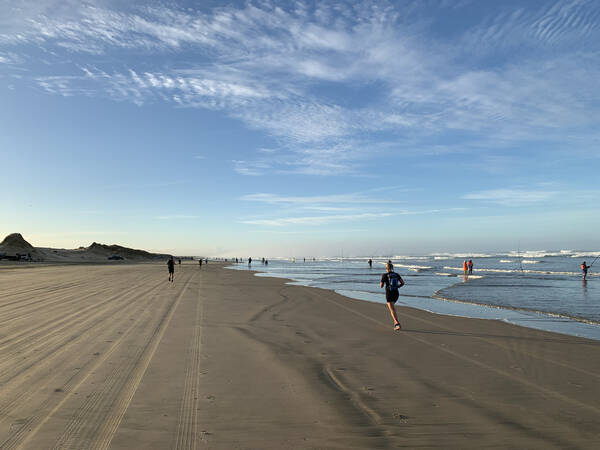
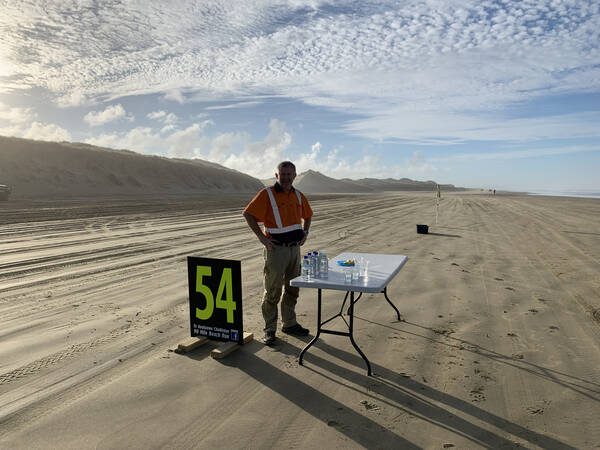
It’s funny how the kilometer signs are counting down instead of up in this race. For me it makes no difference. I have the numbers running through my head anyways, and they don’t affect my mental state that much. But I wondered if it might not have been intended this way around.
At this point I was running at about 5th place I guessed. When I realized the small number of participants I hoped I could replicate another Top 10 finish just as on Waiheke last weekend. But you can never know the strength of the field. Here, a bunch of them looked really fit and ran off into the distance right from the start.
A Maths Excursion
As we have a nearly even surface up until the horizon, one can calculate the distance visible until it. As the German band Knorkator explained in their song “Wie weit ist es bis zum Horizont?”, you can just use the Pythagoras theorem because the three points (1) my eyes, (2) the horizon, and (3) the center of the earth, form a right triangle. My eyes might be at an average height of 1.8 meters measured from the sand, as I am about 1.9 meters tall. Put the numbers into Wolfram Alpha, for example, and you end up with 4,792 meters in my case. (If you ignore that the person on the horizon has a height as well and is not flat on that point where my eye’s beam meets the horizon. Details!)
If someone is so far ahead of me I just barely can’t see them anymore, this must be the theoretical distance between us, right?
Turns out, that not accurate in reality. And this is a well suited place to put this to a test. I think one of the problems is my own eyesight, which is quite good, but spotting a tiny dot nearly five kilometers away is too much too ask. Also, the earth has some unevenness in it, even if it seems completely round seen from space, as I learned while studying geodesy for a short while. And the reflexions of light on the sand might create a Fata Morgana effect, making it even harder to distinguish.
During this race I had plenty of time approximating the visible distance between me and objects in the distance. There were the aid stations at exactly every three kilometers and my GPS watch as points of reference. Now, I would guess that I can make out a runner in front of me if they are not further away than about 2 or 2.5 kilometers.
Another reference were the aid station volunteers. At first I asked them just for fun, how many people have already come through and how far ahead they were. But as the kilometers went away and I overtook a few people, I got more eager and started seeing the game here. Have I got a chance at reaching Top 3, even? Seems possible! Position 5, 4.
At our kilometer 21, I saw the starting point of the marathon race. A dozen or so runners had started here, apparently not too long ago. Soon I passed by the slower ones of them. After around 30 kilometers I had reached third position. Just by keeping my planned steady pace of 5:30 minutes per kilometer. I was thinking I was second, but a more observant aid station volunteer told me the truth. Still, third is amazing, I thought.
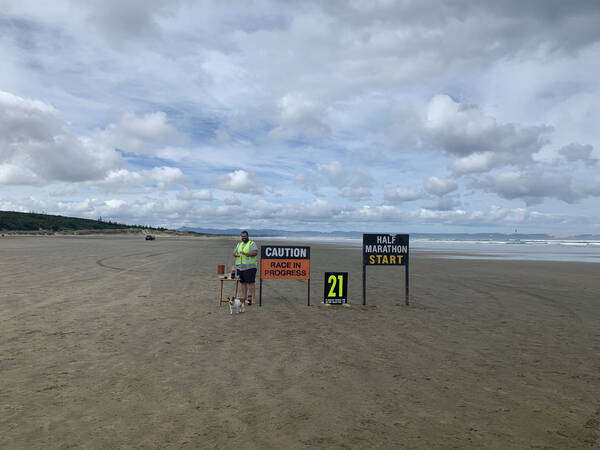
42 kilometers down, 21 more to go. 3:51 hours so far, a good time, and I felt strong. Surely, some energy is gone after nearly four hours of running, but the water and Coke helped a lot. I was wondering if the missing salt would turn out to be a problem. But then I remembered we had an ocean full of saltwater right next to us. If push came to shove, I could just step in and have a sip. Might be a lifesaver.
One of the aid station volunteers asks me to point to the direction of the finish line. It’s been a trick question to make me realize the huge curve the beach follows. Interesting, I think. “If I just swam there, the distance would be shorter!” – I joke. He isn’t getting it. “It will take a longer time. Please don’t try that.”
At every aid station I took a look behind me to see if there were runners coming up. But the distance seemed to increase. At one point, a volunteer told me that the current number two isn’t too far ahead, but that number one is nearly 7 minutes away. That seemed like a long time, but in ultras, that can be gone really quickly. Or dramatically extended just as quickly.
That second place runner actually came close to me, though. I could see him clearly, soon. I got a bit excited as I saw that he had to take a few walking breaks in between running – his energy level must be low already, I can take him! And that really happened. Soon I was next to him, chatting him up. We had a few minutes together, he was a great sport and very honest about not being able to keep the pace. So he soon let me go and continue my 5:30 pace. When he gave the info that number one is probably about two kilometers in front of us right now, I thought that’s it. I’m not going to catch him unless he makes a mistake. Two kilometers is about 11 minutes at my current pace, so he had even extended the lead.
Lessons to be Learned
But this wasn’t the end. We’re somewhere in the low 50s, and at the 51 aid station I get told that number one is not far ahead anymore and apparently struggling. That’s all I need to hear! There’s a chance I could actually win a race!
And then I can see him. It must be him. He looks back often to make sure the distance between us doesn’t increase. For a while it’s like an invisible rubber band between us. He runs, gains a few seconds on me, then has to stop and walk, looking back and losing those seconds again. He’s still too far away to make out facial expressions, or for us to be able to hear each other. Seems to me he is eager to win this.
I remember that volunteer who told me that it makes a difference here to run as close to the water as possible because we’ll save actual distance that way. So I do. He sees me and copies it. Fair enough. But then, he reaches the aid station at 54 kilometers, but as it’s maybe a hundred meters off of the optimum route, he decides to skip it. I think that’s quite foolish at this stage. We need all the water and calories we can get! So I run to that station and fuel up as much as possible. It’s the smart thing to do. It again loses me a few seconds on him. The volunteer says that the runner in front seemed to be swaying and not doing too well, energy-wise. I didn’t notice that, but this makes me think that hopefully he’s going to be a bit smarter soon regarding nutrition. People have died using his strategy during marathons and other ultra endurance events. Definitely not worth it.
We continue our little chase, always just maybe between one and three minutes apart from each other. At the next aid station, at 57 kilometers, I am glad to see him decide in favor of nutrition this time. I can see he hastily has two small cups of something. Better than nothing. When I reach the station shortly thereafter, the guys tell me he seemed done and so much out of energy he could barely talk. I noticed that. He still keeps turning towards me and running away, just to have to walk again and lose the advantage on me, again. This is also a beginner’s mistake, I keep thinking. Steady pace is a superior strategy.
Not far after that station, maybe at 57.5, it happens. He falls forward on his knees. The sand is completely flat, there is no other explanation for it than he having lost his power to keep the feet up high enough. He’s still too far away to be able to understand me, but I want to say to him that he should listen to his body and maybe take a break. Of course, that would sound strange coming from the second place guy who’s chasing you.
He gets up, stumbles, runs a few hundred meters more, still looking back at me from time to time, and then stops. He’s just standing there, looking back, and I get a bad feeling about this. And then he falls down. Right back onto the sand, just like a boxer who had just been knocked unconscious. This is it, I think. He must realize he miscalculated, now! But no. He sits there, trying to get up again but clearly failing. His body won’t let him. There’s just nothing left.
Crap. Think quick now. What do I do? He needs help, that’s obviously the priority. Can I carry him somehow? He’s a strong looking guy and I also have 58 kilometers in my legs. Probably not a great idea, as it would be at least one kilometer to the next or previous aid station. But then, a car appears. Some tourist drives on the beach right towards us. I run to him and signal him to stop. It’s a dad with two little kids in the back seats. When I explain the situation, point to the still passed out guy and ask him for help, he just surprisingly says “Oh but he can just walk back!”, trying to get out of helping – but he clearly can’t even get up. I manage to convince the guy and we run towards that poor runner.
I tell him to lie down and pick up his legs. As you do when people’s circulation fails. Blood needs to flow back into the brain. I’ve seen this before at other marathons. I tell him to relax while I hold his legs up, but he is so far out he can’t really comprehend what I’m saying, can’t even talk straight, but mumbles something like “Bro let’s run!” – sorry but not the best idea right now! Suddenly, in comes a wave from the ocean, so now he’s soaked as well, adding insult to injury. He doesn’t even notice anymore. Completely white face, eyes turning, whole body cramping. I tell the dad to please stay with him for a while so I can run to the next aid station and get help. There’s no cellphone reception around here. He agrees, fortunately.
So I run. Now I am the one who turns back a lot, but for different reasons. I can see the dad has helped the runner back onto his feet, foolishly. The runner is still struggling to even stand. He should just lie down. The dad doesn’t understand. But the best course of action, I decide, is to actually now tell the team about it as quickly as possible.
On that kilometer to the next aid station at 60, I check the phone and as soon as I get reception, I tell Sophie. She is at the aid staton at 60, waiting for me with the kids. Perfect. She quickly tells the team and they send a car and call an ambulance. Good. That’s settled.
Now it’s time to realize I’m in first place here. Woah. Five hours of rather uneventful running, then a few minutes of a high-stress situation caring for that collapsed guy. That’s something to process first.
Leading the Pack
I can’t help but feeling a bit guilty. I think I have done enough to help and he should be taken care of by now. But do I really deserve to be in first place right now? He was the better runner, leading all the time right from the start and running faster.
But then I came to my senses. Of course, it’s also a participant’s job to make sure to finish standing up straight, without someone carrying you. Running faster for most of the time isn’t what’s required, reaching the finish line is. I remembered what Jan Frodeno, the incredibly successful triathlete, said during an interview while the IRONMAN World Championships 2018 in Hawaii were on the way. He had enjoyed an insanely good season, winning everything he entered against all the best athletes, but then he injured himself and wasn’t ready for the Hawaiian main event of the year. His words were, that it’s also an athlete’s job to be fit and healthy on race day. And even though he might have won that day, he couldn’t, so he’s the one to blame. I think that’s comparable to our current situation.
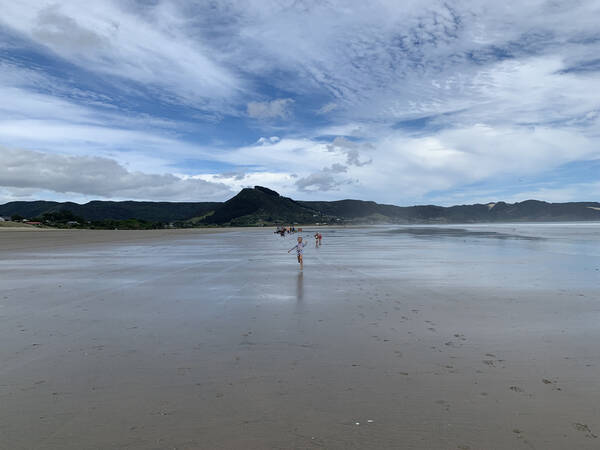
So now it’s time to hug the kids first. And have a chat with Sophie and the aid station volunteer. They seem to have it under control and are on the way to get him. Good.
I’m glad to say that I later got the message that James (that’s his name) has recovered well after a few nights in hospital battling the sever dehydration he brought upon himself. Lessons learned, I hope.
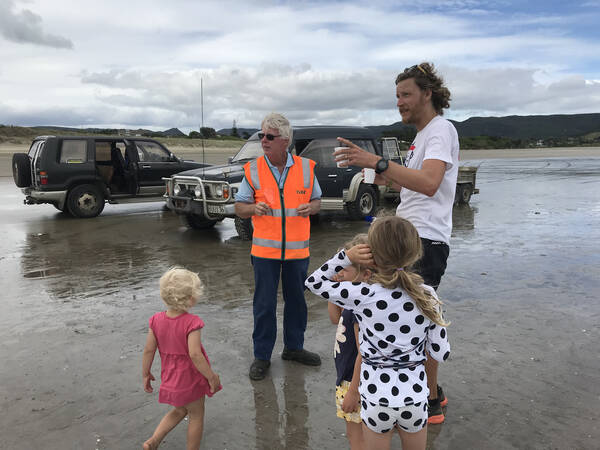
For me, it’s three more kilometers to go to the finish, while currently in first place. Exciting! How far behind is the next one? Is there maybe one who caught an extra bit of energy and came close to me? I lost many minutes helping the guy and talking to volunteers today. Will that now come back and bite me?
Also, my own energy levels are declining as well. Nowhere near a critical level, but I feel the urge to walk. And so, after another kilometer, I text Sophie if second place has already come by. No. Time for a short walking break! But as the remaining distance is so short, I decide it’s alright to just push through.
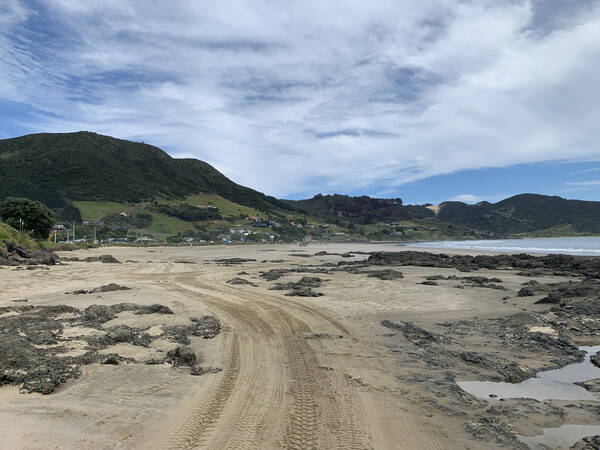
Wow, this is really happening. I am about to win an ultramarathon race. Who can say that? Not many people. Surely, this is not a tough race and the field wasn’t the strongest or biggest, also I got a bit lucky that I knew more about nutrition than others, but nonetheless. This is an ultramarathon win.
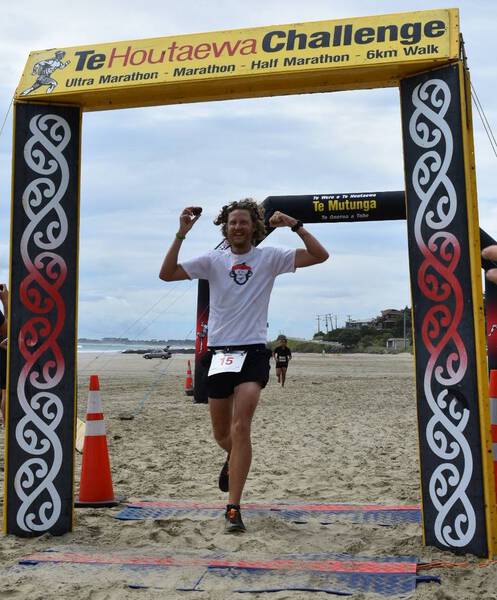

This is amazing, to say the least. I never thought the day would come.
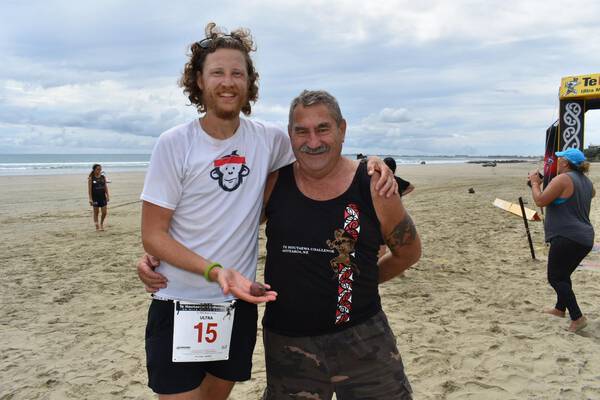
And then it’s sitting down and relaxing in the sand. I walk into the ocean barefoot to cool off the battered feet. Neat. Many people congratulate me and chat me up. Lots of respect.
Just three minutes later, second place arrives – and it’s a lady! Well done to her. She’s equally done and we congratulate each other on the win. Then I remember that winners usually get given prizes and I ask about a prize-giving ceremony. I think I’ve never been to one. Yes, there is one, and it’s in two hours. “If I knew there would be prizes I would have hurried up!” – I said to a few laughing people. I am very much allowed to throw around such stupid dad jokes, and I like it.
But those two hours are better spent with family, so I head home for a shower and some play time. The girls are very excited and have been for a while, Sophie tells me. I gave her updates throughout the race, so they always knew when I moved up a rank and got close to first place and then kept it that way. I can kind of tell they are experiencing a new feeling they can’t explain. It might be pride.
An ultramarathon is still an ultramarathon, so I need a shower, snacks, drinks, and a power-nap to come back. We drive over to the event area, excited for what the ceremony will be like.
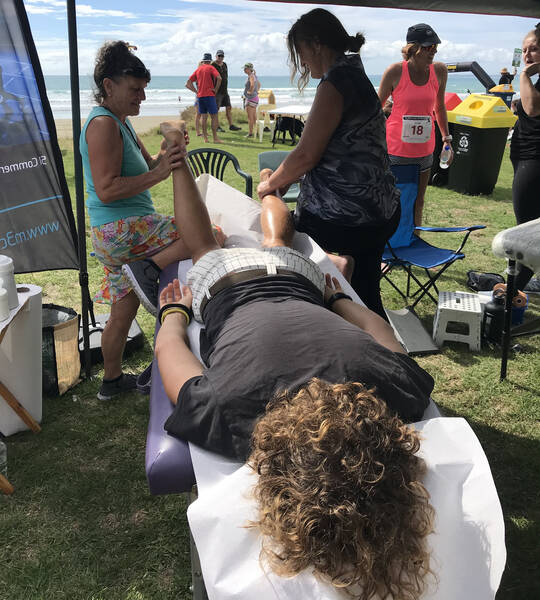

There were 14 finishers, total. Out of maybe 20 starters, I’m not too sure. Everyone receives a traditionally hand-made Maori backpack, which is really nice and unique. I’m the first.
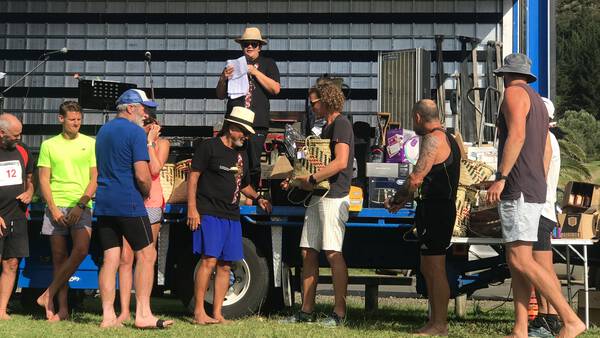
And then I get handed this trophy.
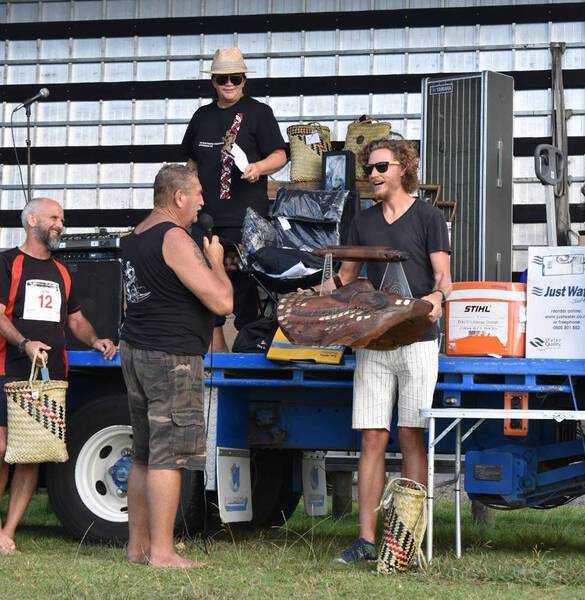
Fortunately, it’s not. It’s a hand-made wooden sculpture which gets each year’s winner and winning time engraved. It’s been going on for 28 years, so now a new little plaque will be added, saying:
2019
Tim Teege
5:58:17 hours
Very cool!
After it’s over and all the participants of the other events have been honored, I take a look into my backpack and see a check for 300 New Zealand Dollars. Now that’s also a nice surprise!
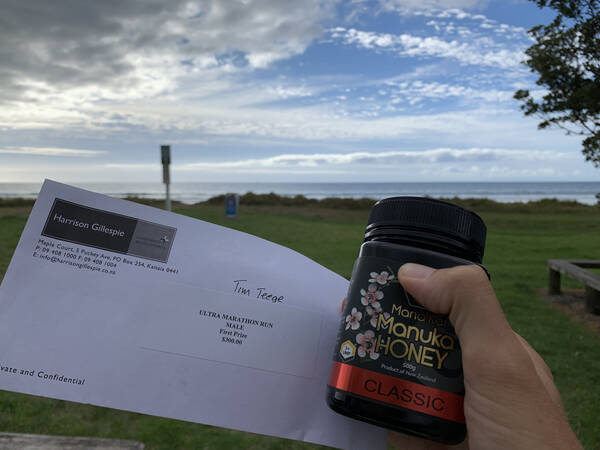
What a great day. Also, now I have a new catch phrase with Sophie, and it’s “Hey remember when I won that ultramarathon race?” and we laugh. It seems so unreal to say that. It‘s something to tell my kids about. “Hey kids, listen up. Remember when I won that ultramarathon race?” – “Yes dad.” – Okay done.
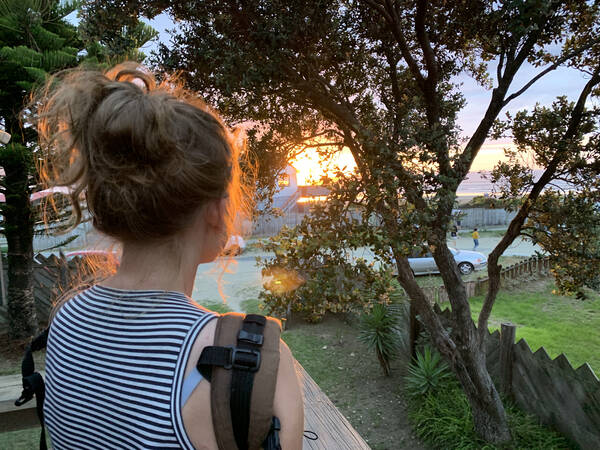
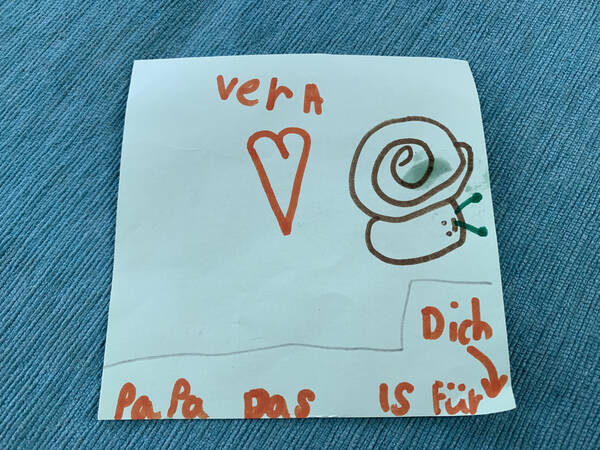
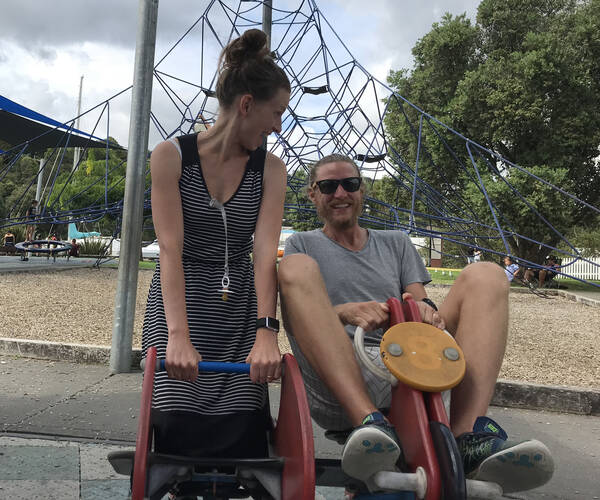
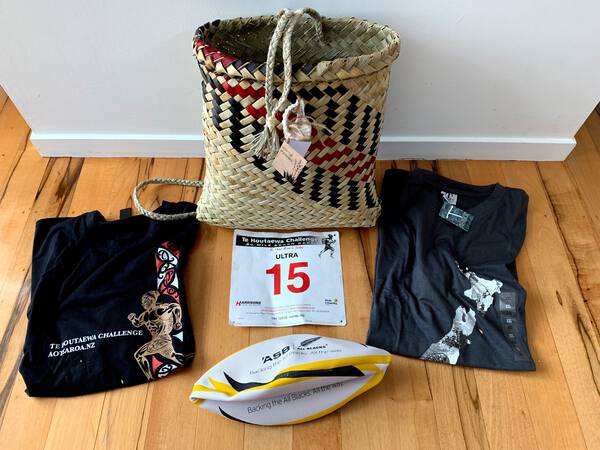
And here’s some Strava tracking. On to the next win! If there ever will be one. Just need to find another small race!
How do you feel after reading this?
This helps me assess the quality of my writing and improve it.
Leave a Comment